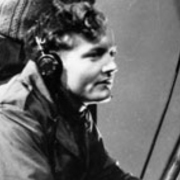
Bob Allen
Robert Ewen Gordon (Bob) Allen was born in 1925. In that year the first public demonstrations of sound-on-film motion pictures were given in New Zealand. By the time Allen started school the ‘talkie’ revolution had swept aside silent pictures, and introduced a new career prospect: recording motion picture sound. At the age of 18 he joined the National Film Unit as a film production assistant, working alongside Geoffrey Scot recording soundtracks for Weekly Review and other films.
At first soundtracks consisted largely of music and commentary, with the occasional addition of sound effects or synchronised speaking. As few cameras were equipped to record sound simultaneously with picture, most film was shot ‘silent’. Portable sound recording equipment was acquired to enable more ambitious sound recording to be attempted outside the confines of the studio. The portable equipment was heavy and cumbersome, requiring physical fitness and a degree of ingenuity (and occasionally a wheelbarrow) to move it around.
The equipment was tested under tropical conditions in 1947 when Allen, along with producer Stanhope Andrews and cameraman Ivo Tisch made a six-week tour of Western Samoa, chronicling the visit of the United Nations Mission for Weekly Review, and the islands’ culture and people for the documentary Samoa, released in 1949.
In late 1948 it was alpine conditions that Allen had to contend with, while recording sound for Journey for Three. To film the alpine rescue sequence on the Tasman Glacier the equipment had to be carried to a high altitude where the cold, the terrain and the weather presented many difficulties in filming and recording. Fiction threatened to become fact when the crew were snowed in at Ball Hut for three days.
With the experience of such challenges Allen accepted an invitation to go to Australia in 1950 to work for Associated TV Pty Ltd recording sound for Captain Thunderbolt, the first feature directed by New Zealander Cecil Holmes. In 1952 Allen spent several months in Fiji working on Burt Lancaster adventure His Majesty O'Keefe. When the prospects for further production in Australia dried up, he set out for England around 1953.
He gained a foothold in the British film industry, working first for the BBC, then for a time as a sound engineer for British Movietone News. By the early 60s he was recording sound for feature films.
Allen considered 1973's adaptation of The Day of the Jackal one of the highlights of his career. He was BAFTA-nominated for his work on the thriller, which was directed by multiple Oscar-winner Fred Zinnemann. Allen also worked with noted directors Clive Donner; on Nothing but the Best (1964) and Here We Go Round the Mulberry Bush (1967); Swedish director Mai Zetterling on Flickorna (1968); Peter Brook on The Persecution and Assassination of Jean-Paul Marat as Performed by the Inmates of the Asylum of Charenton under the Direction of the Marquis de Sade (1966) and King Lear (1970); and Peter Hall, on Three into Two Won't Go (1968), Harold Pinter adaptation The Homecoming (1973), and village tale Akenfield (1974).
In April 1976, Allen briefly rejoined the NFU, recording sound for a number of short films including Architect Athfield (1977). Putting his overseas experience to good effect, he then recorded sound on the features Solo (1977) in New Zealand, and The Chant of Jimmie Blacksmith (1978) in Australia, before returning to his UK base. He was sought out from time to time to contribute his expertise on further New Zealand features: Bad Blood (1981), Leave all Fair (1985), Ngati (1987), Crush (1992), and Leon Narbey's The Footstep Man (1992), a rare film to feature a soundman as the central protagonist. Earlier Allen won a 1988 NZ Film and TV Award for his contribution to Narbey's classic goldmining tale Illustrious Energy.
Allen was a founder member of the Association of Motion Picture Sound, an organisation of film sound technicians based in the UK, and edited their newsletter for many years. The history of motion picture sound recording was of particular interest to him, as were the stories of his fellow technicians. He had witnessed many technological developments in his own working life and adapted to the changes with a practical interest.
In 2003, New Zealand again became home, but he continued to keep up with motion picture sound matters in the UK. He died at Hutt Hospital on 18 June 2006. He was 81.
Writing and Original Research by Clive Sowry
Sources include
Shirley Allen
Bill Sheat, David Hannay, Tony Williams, and Fred Schepisi, ‘In Memoriam: 'Bob Allen 1925-2006’ – Onfilm (Volume 23 No 8), August 2006, page 21
Diana Dekker, ‘Silent role behind the cameras’ – The Dominion Post, 20 July 2006, page B7
'Allen, Robert (Bob)' (Death Notice) – The Dominion Post, 21 June 2006, page D9
Bob Allen, ‘Fred Zinnemann 1907-1997’ – Newsletter of the Association of Motion Picture Sound, Issue 22, Summer 1997, page 12
Unknown writer, ‘Exported Talent’ – NZ Truth, 17 September 1957, page 14
Unknown writer, ‘Unusual N.Z. Film. Documentary on Immigrants. Scenes Taken at Lake Pukaki.’ – The Press, 6 September 1948, page 8
Unknown writer, ‘Western Samoa. “Incredibly Beautiful”. National Film Unit’s Tour’ – The Evening Post, 1 September 1947